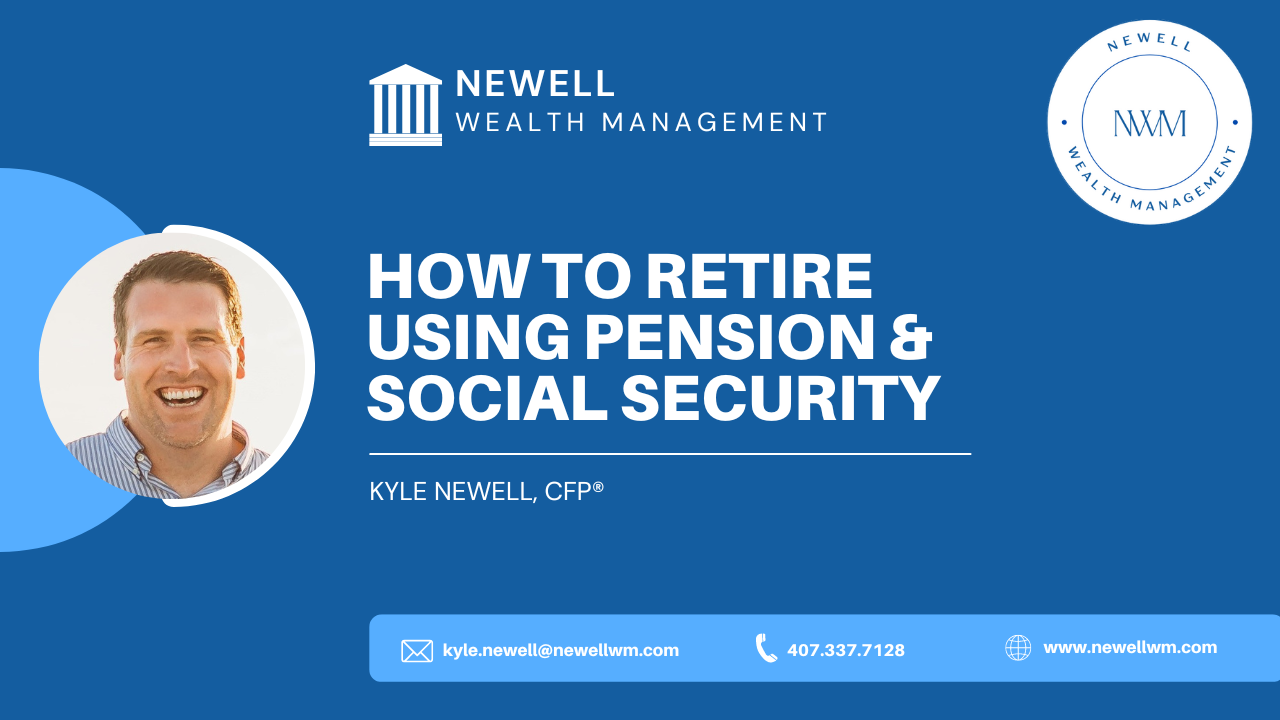How to Retire Using Pension and Social Security

If you are getting close to retirement, you may be looking at where your income will generate from. Many people immediately consider using a pension and Social Security. If you’ve worked for a company for many years and have a pension, consider yourself lucky. Pensions have been going the way of the dinosaur.
Having a pension and Social Security is an excellent position to be in when it comes to retirement planning. However, it’s not foolproof. There are things to consider when planning for retirement income with a pension and Social Security.
Timing
There are two parts to look at where timing is concerned.
- Timing of retirement
- Timing of taking the income
These two work in tandem and should be considered together when financial planning for retirement.
You may be in your late 50s or early 60s and fed up with the corporate world. The rat race is taking a toll; you’re ready to stop. You’re unsure when to start claiming the income. You’re wise to pause and question it.
The timing of when to retire becomes pivotal when you’re planning to retire with a pension and Social Security as part of your overall income strategy. There are irreversible consequences to start claiming a pension and Social Security. Let’s look at the rules for each.
Social Security
You can start claiming Social Security generally at 62, all the way to 70. The full retirement age for Social Security is based on your birth year. For most people who are retiring or thinking about retiring over the next few years or later, it’s either 66 and a few months or 67.
Full retirement age is when you receive your full benefit. However, if you claim earlier, you will get docked an early withdrawal penalty of a little over 7% per year. This means your benefit reduces every year that you claim early by about 7%. It’s not exactly 7%, but it’s close.
If you want to retire earlier than full retirement age and plan to use Social Security as part of your income strategy, the timing of when to claim your benefit becomes part of the equation. Does the penalty create a problem with your retirement income needs? It doesn’t mean you can’t retire early, but you may want to consider an alternate means of income until you can claim the full Social Security benefit.
The flip side is also true if you wait to claim Social Security until after your full retirement age. 70 is the maximum age that you can claim. You would then have the ability to have increases in your benefit. This can be beneficial when you consider a 7% bump in benefits every year.
Social Security should be around, at least for a while, depending on how things go. Just a few years ago, 7% was a tough return to achieve on any sort of conservative investment. Currently, investments are getting closer to that, but market rates and investments change. Claiming your benefits later will give you a lift in income.
It still begs the question of when you should retire if you’re using Social Security as your income. A lot of that depends on the second component of the question, which is whether or not you have a pension.
Pension
The pension component is important because pensions can vary on when you have the full benefit. Some require you to hit a certain number of years working at the company. Others base it on turning a specific age.
It’s essential to understand your pension plan documents. Each plan is created independently. There may be similarities but also crucial differences. You need to know things like:
- What’s the maximum benefit you will receive
- Is it based on number of years worked
- Is it based on your age
- Are there other formulas or metrics involved in determining your pension benefit
Let’s look at The Walt Disney Company’s pension plan. Their pension plan maxes out at 65. Based on how the numbers work out, even if you retire early, you get more benefits at 65 than at 62.
When factoring a pension into your retirement income plans, you want to consider the maximum benefit you can receive and how you achieve it. The answer may become a determining factor on when to claim your pension.

When Do You Want to Retire?
If you want to retire at 60, with a pension benefit maximum starting at 65 and a full retirement age of 67 – you need a plan to cover income in those gap years. That’s not necessarily to say you want to take Social Security early because the risk with retirement, more often than not, is living a long life rather than a shorter time.
The numbers are more straightforward if you live for a short time. To have a solid financial retirement plan, planning for living longer is essential. You don’t want to run out of money.
Planning for a longer life may dictate delaying some of your benefits to receive the maximum. It’s not so much for the income in the short term of five to ten years. It’s looking toward the 20 or 30-year mark when you might be in your 80s or even early 90s.
Married people should also consider the impact of benefits on their spouse if they were to pass away. This is especially important if your spouse made less income or did not work outside the home. These are factors to consider that will impact your benefit, but potentially your spouse’s benefit as well.
What Are Your Other Resources?
If you want to retire before your pension or Social Security starts, it’s worth considering if you have other assets to live off of. Using those assets in a safe and tax-efficient manner to support yourself until you can claim your pension and Social Security is a great way to fill the gap.
How Does Inflation Impact Pension and Social Security Benefits?
We’ve talked about inflation before. It’s a key component of financial planning for retirement that many overlook.
Sometimes a pension will adjust for inflation. Sometimes not. The Disney pension does not adjust for inflation. However, other companies’ pensions may adapt. You need to understand how your pension plan considers inflation. If it doesn’t adjust, it can be a significant factor in being able to cover your expenses in retirement.
Historically inflation always goes up. Things will not cost the same five, ten, or 30 years from now. Planning for inflation and longevity in retirement will help you avoid income shortfalls if your pension does not adjust.
The good news with Social Security is that it adjusts with inflation. Inflation can be a primary argument for delaying Social Security benefits. While the inflation numbers are the same, it starts with a larger amount. Remember the 7% increase?
The downside to delaying a pension or Social Security is if you were to pass away early. You would lose out on the benefit you were due. Your company set money aside for you in their pension plan. You worked all those years putting money away into Social Security.
We’ve all heard stories of somebody retiring and then six months later passing away. They’re tragic stories, and it’s unfortunate. The living have this visceral reaction of wanting to get every penny they’re due before their time is up. The reality is that none of us know when that time is.
If you’re dead, you won’t care whether you got your money or not. That’s a straightforward statement that often takes people by surprise. It’s also the reason you want to plan prudently.
The more considerable risk is living longer rather than shorter. Plan for longer.
Taxation of Your Assets
The last thing is the taxation when you start your benefits—taxation factors into determining the best way to generate income in retirement. We’re talking about pensions and Social Security as sources of income. You may have other assets you’re now considering using to supplement, such as a 401k or an IRA.
Your pension and Social Security may be enough to live off of. That sets your income for retirement. However, you may fall within a certain bracket and want to readjust some of your other assets to be more tax-efficient long term.
One Other Note
Be aware of your tax bracket and also of Medicare rates. Pricing for Medicare is based on your income. It’s a two-year delay, so it’s convoluted to calculate all of that. Nonetheless, you should also be aware of how Medicare impacts your taxation rates.
Remember, if you’re looking to retire and have a pension and Social Security, think about
- When should you take your benefits
- What the financial impact of taking them will be
- Will you have any income gaps, and how will you fill them
- Taxation on your income and Medicare rates
My goal for clients and you are to retire once and retire well. Are you looking for guidance on a financial retirement plan? I’m happy to help.
We can meet virtually or in person if you live in the Central Florida area. Please email me at kyle.newell@newellwm.com, call/text at 407.337.7128, or schedule a meeting at Schedule – Newell Wealth Management (newellwm.com)
Important Information
Newell Wealth Management, LLC (“NWM”) is a registered investment advisor offering advisory services in the State of FL and in other jurisdictions where exempted. Registration does not imply a certain level of skill or training. The presence of this website on the Internet shall not be directly or indirectly interpreted as a solicitation of investment advisory services to persons of another jurisdiction unless otherwise permitted by statute. Follow-up or individualized responses to consumers in a particular state by NWM in the rendering of personalized investment advice for compensation shall not be made without our first complying with jurisdiction requirements or pursuant an applicable state exemption.
All written content on this site is for information purposes only and is not intended to provide specific advice or recommendations for any individual. Opinions expressed herein are solely those of NWM, unless otherwise specifically cited. Kyle Newell and NWM are neither an attorney nor an accountant, and no portion of this website content should be interpreted as legal, accounting or tax advice. Material presented is believed to be from reliable sources and no representations are made by our firm as to other parties’ informational accuracy or completeness. There is no assurance that the views or strategies discussed are suitable for all investors or will yield positive outcomes. Investment involves risks including possible loss of principal and unless otherwise stated, are not guaranteed. Any economic forecasts set forth may not develop as predicted and are subject to change. All information or ideas provided should be discussed in detail with an advisor, accountant or legal counsel prior to implementation.
